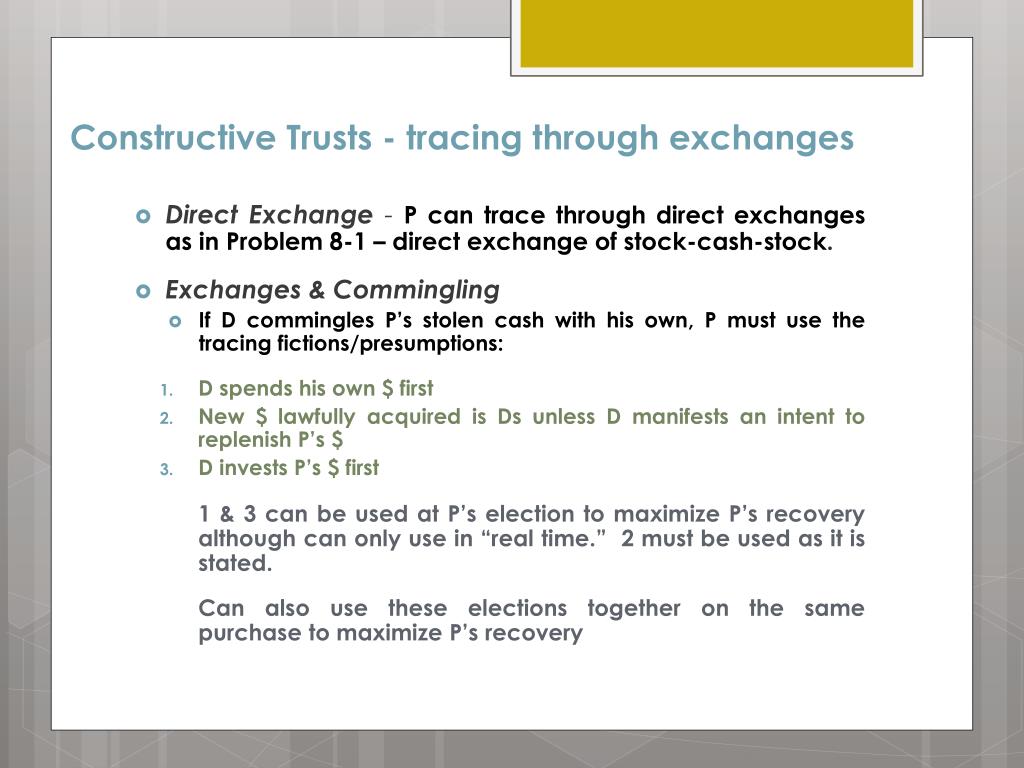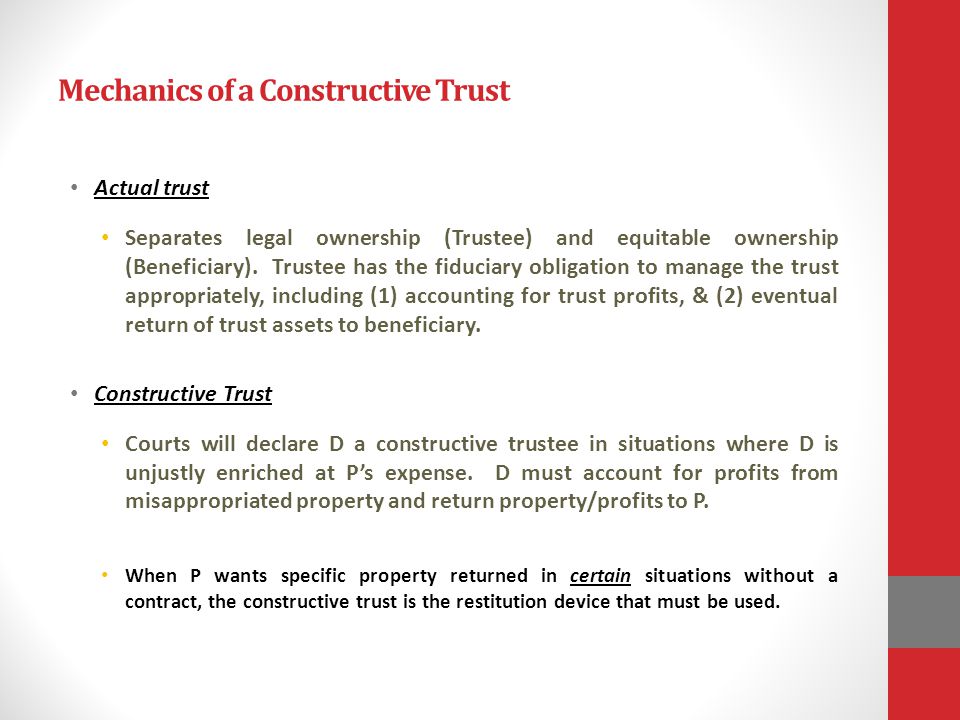Judicial Perspective Surrounding What Is A Constructive Trust Discussed
Wiki Article
Checking out How Does a Constructive Count On Work in Residential Or Commercial Property and Possession Disputes
The idea of a useful depend on acts as an important mechanism within residential or commercial property and asset disputes, dealing with circumstances where one party has unfairly profited at the cost of an additional. This equitable treatment not only looks for to remedy injustices but also highlights the value of purpose and payment in figuring out rightful ownership. By analyzing the nuances of just how useful depends on run, one can discover the complexities that typically emerge in legal contexts. What implications do these trusts hold for future disputes, and how might they affect the landscape of residential or commercial property law?
Definition of Constructive Depend On
A constructive depend on emerges when a court identifies that it is essential to avoid unjustified enrichment, frequently in circumstances where a party has actually obtained home with wrongful means or under conditions that require fair relief. This legal treatment is not officially established by the parties included; instead, it is enforced by the court to attend to situations where fairness and justice need treatment.Useful depends on are frequently invoked in cases including fraud, violation of fiduciary task, or various other types of misbehavior. As an example, if an individual wrongfully acquires property that rightfully comes from another, the court might impose a useful depend make certain that the culprit holds the home for the benefit of the rightful owner. This lawful idea operates on the principle that it would certainly be inequitable for the wrongdoer to keep the benefits acquired from their misconduct.
Inevitably, a constructive trust fund offers as an effective device in building conflicts, strengthening the concept that ownership should show not only lawful title but additionally honest factors to consider. By identifying the requirement for equitable alleviation, courts guarantee that justice prevails in the circulation of building and possessions.
Secret Concepts of Constructive Depends On
While the application of constructive depends on might differ depending upon specific conditions, several essential concepts consistently underpin their enforcement in building disputes. Firstly, the concept of unjust enrichment plays an essential duty; a positive depend on is often imposed to avoid one event from unjustly profiting at the expense of one more. This concept emphasizes the equitable nature of positive depends on, highlighting that lawful ownership does not always equate to rightful possession.Secondly, the requirement of a fiduciary connection is substantial. What Is A Constructive Trust. Positive depends on often occur in contexts where one celebration has a task to act in the ideal interests of an additional, such as in partnerships or joint ventures. Breaches of this duty can set off the imposition of a positive depend shield the aggrieved celebration's rate of interests
Furthermore, the doctrine of purpose is essential, as courts consider whether the celebrations meant to create a trust-like relationship, also if not officially documented. Ultimately, the concept of equitable solutions highlights that constructive trust funds serve to give relief that straightens with fairness and justice, making sure that the rightful claimant can gain back building or possessions that they are qualified to, despite lawful title living somewhere else.
Applications in Residential Or Commercial Property Disputes
Positive depends on discover substantial application in home conflicts, specifically when dealing with problems of possession and equitable rights. These trust funds arise in circumstances where one party holds property under problems that, in fairness and justice, should profit an additional party. The equitable treatment of a positive trust stops unjust enrichment by identifying the contributions of an event that, in spite of doing not have formal title, has a reputable case to the home.One usual scenario includes cohabiting partners who add to the purchase or upkeep of residential or commercial property however are out the title deed. In such instances, the courts might impose a constructive count on to show the celebrations' intentions and contributions, therefore ensuring that the non-titled partner gets a reasonable share of the residential or commercial property.
Furthermore, useful depends on can be vital in disputes involving inheritance or family residential or commercial property, where a decedent's intent might not have been officially documented. Courts might infer a useful count on to recognize the decedent's desires and correct prospective inequities amongst successors. On the whole, constructive trust funds act as an essential device in balancing civil liberties and ensuring fair results in residential property disputes, strengthening the principle that fairness must prevail in ownership matters.
Instance Researches and Examples
Residential property disputes including constructive counts on can typically be shown via real-life study that highlight the intricacies and nuances of fair civil liberties. One significant case is * Gissing v. Gissing *, where a partner declared a valuable rate of interest in the household home, arguing that her monetary contributions during the marital relationship necessitated a useful depend on. The court eventually regulationed in her support, developing that her contributions produced a fair interest despite the residential property being only in her hubby's name.An additional illustratory case is * Thompson v. Thompson *, where brother or sisters disputed the ownership of a family estate after their parents' passing away. One brother or sister had kept and improved the property, asserting that these activities justified a constructive trust. The court recognized the sibling's efforts and found that a useful depend on published here was essential to stop unjustified enrichment, thus granting them a share in the estate.
These situations exemplify how constructive depends on offer to resolve scenarios where legal possession does not reflect the real fair rate of interests of the events included, highlighting the relevance of intent and payments in determining rightful cases in residential or commercial property disputes.
Legal Ramifications and Factors To Consider
When dealing with constructive trust funds in residential property disagreements,Various legal ramifications and factors to consider occur. Foremost, the facility of a positive trust fund normally depends upon the presence of an unjustified enrichment, in which one event advantages at the expenditure of an additional. This concept demands a detailed exam of the partnership in between the events and the situations that resulted in the alleged inequity.In addition, courts commonly require clear proof of the claimant's contribution to the home or possession in inquiry, which can include financial investments, labor, or various other kinds of assistance. The worry of evidence resides the plaintiff, demanding thorough documents and statement to substantiate their insurance claims.
In addition, the timing of claims is vital, as statutes of restrictions might restrict the capability to establish a constructive trust after a specific duration. Legal advise has to navigate these time restrictions carefully to make sure that cases are submitted in a prompt way.
Last but not least, the capacity for conflicts over the intent behind home transfers can complicate issues additionally, necessitating a nuanced understanding of both legal law and instance regulation to properly support for a client's passions in useful trust claims.
Verdict

The principle of a constructive trust serves as an check this important mechanism within home and asset disputes, addressing circumstances where one celebration has unfairly benefited at the expenditure of you can find out more one more. If an individual wrongfully takes ownership of residential or commercial property that rightfully belongs to another, the court might enforce a positive trust to guarantee that the wrongdoer holds the property for the benefit of the rightful proprietor.Positive counts on locate significant application in building disputes, specifically when addressing issues of ownership and fair civil liberties. Overall, constructive trusts offer as an essential tool in balancing civil liberties and ensuring fair results in property disputes, strengthening the concept that fairness should prevail in possession issues.
In summary, positive trust funds offer as essential equitable solutions in home and property conflicts, resolving unjust enrichment by recognizing the contributions of parties involved. - What Is A Constructive Trust
Report this wiki page